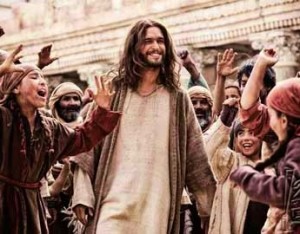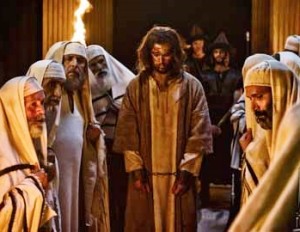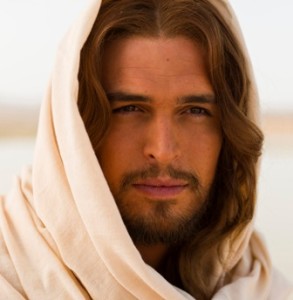Son of God movie: Jesus for the third millennium
by Meg Korpi
When I first met television producer Mark Burnett (Survivor, Shark Tank, The Voice), he was lunging through a small band of onlookers, bicep flexed, hammering the air with an emphatic fist. “I see him as strong—powerful, impressive,” he was saying. I could fairly hear the BANG! as fist struck air. He had my attention. “Who?” I asked, intrigued. Burnett looked at me and repeated the display for emphasis. “Jesus,” came the unexpected reply.
Burnett was dramatizing his view of Jesus of Nazareth, and how he would depict him on screen. A year later, The Bible miniseries, produced by Burnett and wife Roma Downey (Touched by an Angel), would shatter records for cable television viewership. Spiritual passion had met blockbuster television production skill.
Now Burnett and Downey have honed that passion and the story of Jesus for the big screen. Son of God (in theaters Feb. 28) combines scenes from their Bible television series with previously unreleased video to create the first major motion picture in over three decades to portray the life, character and legacy of the biblical Jesus. (Mel Gibson’s The Passion of the Christ bears acknowledgment, but its specialized emphasis enriches, rather than replaces, broader depictions of Jesus.)
Do we really need another Jesus movie?
But do we really need another Jesus movie? Consider this: Jesus of Nazareth has influenced people and events for 2000 years; he still influences the daily lives of billions. He is arguably the most important figure in history. It seems that basic literacy, if nothing else, would require sound knowledge of such a person.
Unfortunately, research indicates that Americans know less about the historical Jesus than they think. Like many public figures, Jesus has been the subject of rumors, gossip and hearsay. Folk stories are easily mistaken for fact. Our most reliable records about Jesus are the New Testament histories. (These were written by individuals who either knew Jesus personally and witnessed the events, or knew the participants. They have been validated by numerous scholars [e.g., Frederic Kenyon, F.F. Bruce, etc.], and are supported by external evidence in the archeological record and ancient Hebrew and Gentile writings.) According to Barna research (2009), “by the time most Americans reach the age of 13 or 14, they think they pretty much know everything of value the Bible has to teach. ” “They are neither open to being proven wrong nor to learning new insights.” As knowledgeable as we Americans like to be, apparently we’re not so informed when it comes to the Bible. Perhaps a biblically based movie about Jesus is exactly what we need.
Accurate and accessible portrait
Of course, one can’t tell the entire story of Jesus in two hours. Son of God‘s accomplishment is to present the essence of Jesus in a compact user-friendly format. It offers viewers an accurate and accessible portrait of Jesus as described in the historical documents. As in any feature-length biopic, events have been condensed and details have been omitted. But with a multitude of theological scholars contributing to the film, the overall portrait has remained faithful to the spirit of the biblical accounts. Think oil painting rather than high-definition photograph.
Religion and politics
Son of God brings vitality to Jesus’ story by focusing on two taboos of polite conversation—religion and politics. Jesus was a controversial figure. Never holding public office or position, he quietly turned first-century religious and political authority on its head. Religious leaders deemed him a dangerous heretic; the Roman governor considered him a potential threat to social order.
A simplistic re-telling of this history would pit Jesus and the good guys against the evil Roman and Jewish authorities. However, the screenwriters adopt a more astute and realistic approach. Digging into the biblical accounts, they portray each contingent comprising rational individuals with heavy responsibilities, people who make sometimes agonizing decisions in order to carry out the burdens of their offices. And therein lies the central conflict: Jesus came to free the world; the religious and political authorities were there to control it.
In this sense, Son of God is a very modern story about power and control. Watching this movie, I was struck that politics and human nature haven’t changed, that many controversies of first century Judea continue today. Somehow, this humble Nazarene continues to threaten those who would control others. They still try to silence him, to prevent his teachings—or even teaching about him—in public forums. It is no accident that many communist and Islamist countries, where central control is fundamental, outlaw teaching about Jesus.
Even in the USA—a modern archetype of political and religious freedom—many would muzzle or diminish Jesus and his supporters. “He is popular among the less educated” says Pilate (the Roman governor) in the movie. They are “poor, uneducated and easy to command,” wrote a Washington Post reporter of evangelical Christians in 1993. “He’ll be forgotten in a week,” says the movie’s Pilate. “Jesus never existed,” say abundant authors of books on Amazon. “We can’t talk about Jesus in public schools,” say educators and parents who misunderstand the Constitution. His story is very alive.
An enigmatic attraction
In contrast to those in power, the masses in the movie love Jesus. Ordinary people are drawn to him by the same enigmatic power that threatens the authorities. He is gentle, but firm; humble, but powerful. To borrow from Kipling, he “keeps his head while all around him are losing theirs.”
He acts with the assurance of one who knows who he is, why he is here, and where he is going. He teaches about God’s Kingdom; forgives sins; remains unruffled by threats; and speaks truth to power. When the high priest asks him, “Are you the Son of God?” (a capital offense if claimed) he answers quietly and firmly, “I AM.”
Rich content
Son of God can be viewed on a surface level, but the film offers rich content for those who would dig deeper. I found myself watching on several levels simultaneously—considering what the story meant to participants 2000 years ago, what it reveals about humanity and God, and how it is relevant today. Viewed this way, the movie presents a rewarding intellectual challenge. Many episodes would provide fertile fodder for discussion.
One glaring omission is Satan’s temptation of Jesus in the wilderness. This crucial episode apparently was deleted to avoid public controversy, rather than for artistic or theological reasons. In The Bible series, veteran Moroccan actor Mohamen Mehdi Ouazanni portrayed Satan. Belatedly, people realized that the man suffers the occupational misfortune (for someone portraying the devil) of resembling President Obama. The furor went viral; serious discussion of the series was temporarily interrupted. (I can envision the real Satan holding his sides with laughter.) Okay, we’ve had our amusement; let’s move on. For the integrity of the story, I hope the producers include this scene in a future cut of the movie.
A different kind of hero
Jesus is a hero who will appeal to those who love truth and hate hypocrisy, who disdain judging others and believe in the power of love and forgiveness. Son of God may help you get to know him better.
Rated PG-13 (USA) “for intense and bloody depiction of The Crucifixion, and for some sequences of violence”
www.SonOfGodMovie.com Theaters USA Canada
Meg Korpi is a writer and editor with Rusty Wright Communications and senior research scientist with the Character Research Institute in Northern California. She holds a PhD from, and formerly taught at, Stanford University. www.RustyWright.com
Meg Korpi © 2014
# # #
Editors: Note pictures below. Click on image to access image file. More images – and higher resolution versions of these images – are here, here, and here.

The crowds love Jesus (Diogo Morgado)
(Casey Crafford / © 2013 LightWorkers Media & Hearst Productions)

Jesus (Diogo Morgado) on trial with the Pharisees
(Joe Alblas / © 2013 LightWorkers Media & Hearst Productions)

Pilate (Greg Hicks) worries about potential unrest
(Casey Crafford / © 2013 LightWorkers Media & Hearst Productions)
